LEN RAWLE
THE PROFESSIONAL AMATEUR
& ORGANIST SUPREME
-oOo-
PAGE TWENTY:
ACCOLADES
-oOo-
Len has been playing the Theatre Organ for most of his life and continues to give a number of concerts each year. He has also been involved with Theatre Organ restoration and is responsible, along with his father and a number of dedicated colleagues, for saving a large number of instruments from being lost. In addition, he has taught many to play and hone their skills at the Theatre and Electronic Organ and has offered many Master Classes. Len has also written a number of pieces for the Theatre Organ, some of which may be found on his EMI Library CD recording, Wurlitzer Era 1920/1980.

-oOo-
Len’s first experience of playing the Theatre Organ took place when he was 11-years old while he and his family were spending their summer holiday at Bournemouth. Prior to his visit, he wrote to Harold Coombs (1903-1964) who played the Theatre Organ at the Pavilion Theatre that summer to ask if he might come and see the Organ. Mr. Coombs proved to be most gracious and allowed Len to not only come and see the Organs, but also to play both the LaFleur/Hammond Organ in the Pavilion Ballroom and the 4-manual Compton Theatre Organ in the Pavilion Theatre. Over the years, Len has played a huge number of Theatre Organs all over Britain, Europe, North America and Australasia.
-oOo-
Len, together with his parents and some friends, formed the London & South East Chapter of the American Theatre Organ Society (ATOS) in 1985, which has been responsible for the presentation of concerts given by organists from both Britain and elsewhere and thereby giving many British devotees of the Theatre Organ perhaps their only opportunity to both see and hear these remarkable virtuosos. Other work of the Chapter includes the restoration and preservation of Theatre Organs together with the encouragement of young organists with the foundation of Organ Competitions, thanks to Len’s mother, Mrs. Edith Rawle. Over the years, Len has served the Chapter in a number of capacities, including the position of Newsletter Editor, and is currently the Chapter’s Musical Advisor and Concert Secretary.
-oOo-
Over the years Len has been recognised for the mammoth contributions he has made to Music by receiving a number of accolades. Regarding the subject of accolades: when asked about the numerous accolades that he has received, Len is reticent to say very much about the many that he has received. He is, most certainly grateful to have received them, but his approach to them is also surrounded with humility.
Despite this approach, he does admit that the accolades that mean the most to him are those approbations made by organists of distinction. He says that such organists understand the many pitfalls of a travelling musician and especially of the work that goes into preparing programmes and dealing with the issues of the day. When pressed to name some of those eminent musicians and luminaries who offered him a considerable amount of encouraging conversation, he includes George Blackmore, Gerald Shaw, Robin Richmond, Vic Hammett, George Wright and Ashley Miller.
Len admits to having received many complimentary letters and telephone calls from the general public, which he says have always been a pleasure to respond to, but these only represent a view of one person, often musically unknown to him.
Len is always happy to receive the accolade where he is invited to return to a concert venue. He adds that, in this respect, he has been well blessed over many decades. Len has also received multiple complimentary write-ups of performances published in newspapers and magazines both in the U.K. and abroad. He quickly adds that he was raised not to allow such accolades to go to his head, but rather to concentrate on the next concert which he always hopes would be the best.
-oOo-
Len’s remarkable talents have been recognised by a number of Theatre Organ Societies both in the U.K. and abroad.
Len has a long history of visiting Australia over the years and giving concerts and consulting. He has visited Perth and environs multiple times. During these visits he has not only played Theatre Organs, but has also serviced them and helped consult on installations. In 1994, members of The Theatre Organ Society of Australia (TOSA), Western Australia Division (WA) offered Len the Patronage of the Society, and he, gratefully and happily accepted this honour and continues in this role.
In addition, for his playing and consulting work, Len has been made Honorary President for Life of the Nederlandse Orgel Federatie (NOF) in 2007.
The American Theatre Organ Society (ATOS) awarded Len Honorary Membership in 2011 and also honored him as The Organist of the Year in 2013. Here In the U.K., the Theatre Organ Club (TOC) elected him as its Patron for the Year on three separate occasions including 2020. Len is also Musical Advisor to the London & South East Chapter of the ATOS.
-oOo-
Over the years, Len has also been recognised by The Queen for his contributions to British Music. This first took the form of receiving invitations to attend several of The Queen’s Garden Parties held yearly at Buckingham Palace.

-oOo-
It is a great honour to be invited to one of The Queen’s Garden Party. It is not possible to acquire invitations to them through direct application to Buckingham Palace. Potential invitees are nominated as guests for invitation by a long established network of sponsors including members of the Government and of the armed services, as well as from different charities. In this way, the organisers hope to achieve a representative cross section of the community.
-oOo-
Royal Garden Parties began in the 1860s and were presided over by Queen Victoria (1819-1901) and allowed her to mix with members of the Upper Class and assorted royal dignitaries from U.K. and abroad. Following WWII, under George VI (1895-1952), the invitees began to reflect a more democratic reflection of society. This situation has been continued by Queen Elizabeth (1926).
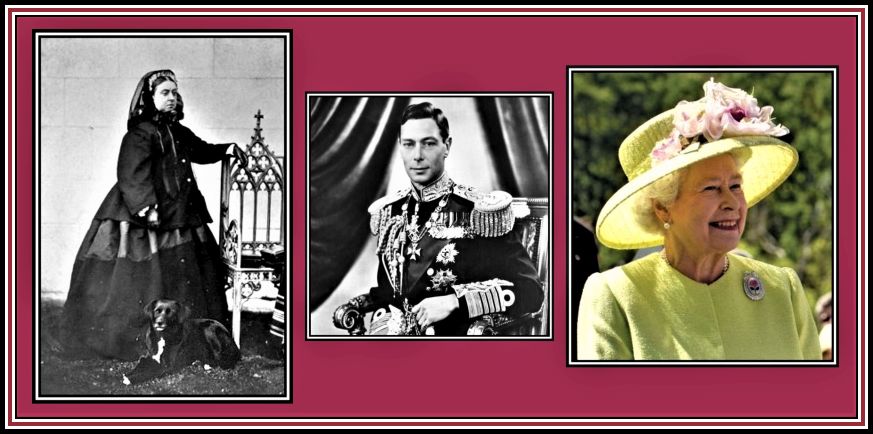 Left: Queen Victoria with Sharp, the Collie dog; Middle: George VI; Right: Elizabeth II
Left: Queen Victoria with Sharp, the Collie dog; Middle: George VI; Right: Elizabeth II
-oOo-
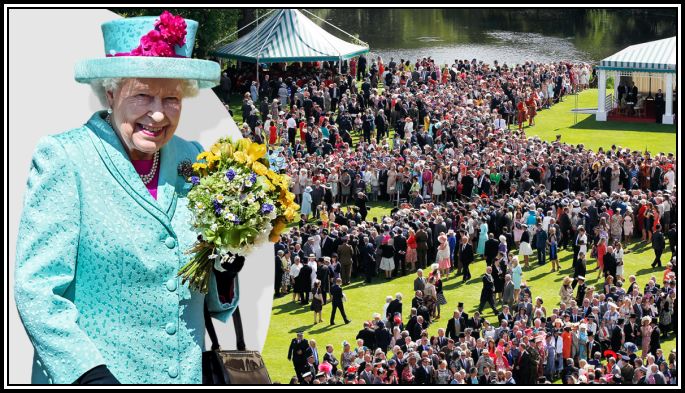
Each year The Queen hosts three parties in the garden of Buckingham Palace and one at The Palace of Holyroodhouse for approximately 30,000 people and has proven to be an important way for The Queen to speak to a broad range of people from all walks of life, all of whom have made a positive impact in their community.

-oOo-
Although Dress is formal, it is less so than it once was. Today men are requested to wear either Morning Dress, Uniform or Lounge Suit, and women, day dress with hats.

-oOo-
The area of the garden where the event is to take place is open to the invited at 3 p.m. and The Royal Party including The Queen, arrive at 4 p.m. She walks around the garden, which allows each of the invited guests, an equal opportunity of meeting her.
Arranged in the garden are a series of neatly arranged long tables covered with white table cloths. On the tables are a number of delicacies for a formal Afternoon Tea (finger sandwiches, scones, cakes and cups of tea).
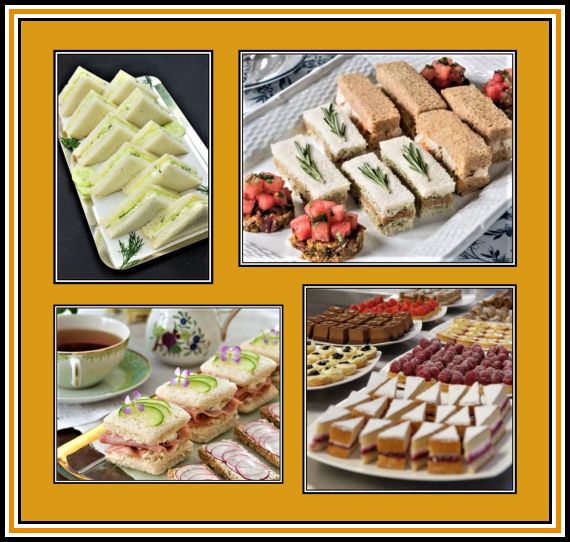
-oOo-
Len and Judith have been invited to The Queen’s Garden Parties at Buckingham Palace on two occasions and were sent about two years apart. They accepted the first, which proved to be an impeccable and unforgettable event.
Len recalls that there were two alternating military bands playing throughout the afternoon while afternoon tea was being served to the approximately 3,000 invitees.
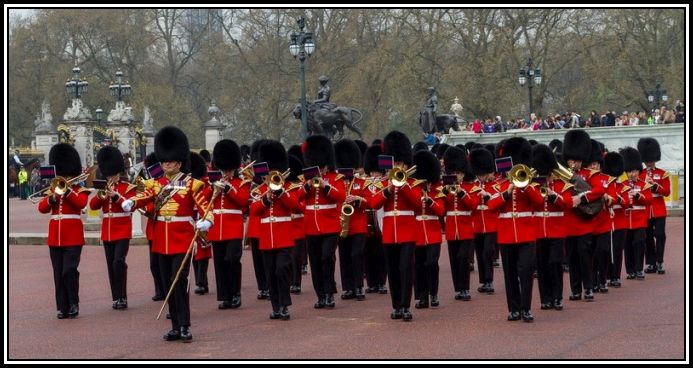 The Band Of Her Majesty’s Coldstream Guards formed on 16th May 1785
The Band Of Her Majesty’s Coldstream Guards formed on 16th May 1785
An English Country Garden
played by The London Festival Orchestra & The Band Of Her Majesty’s Coldstream Guards
-oOo-
Len remembers that everyone was dressed in their Sunday best and invited to wander freely about the Garden and rub shoulders with the other invitees.

-oOo-
Len adds that the whole experience had a touch of perfection to it that clearly benefitted from the precision military operation that surrounds the Royal family on a daily basis. Both the Police and the military personnel performed their duties in a manner that gave one a sense of well- being that encouraged them to raise their own standards of excellence in all matters from then on.

-oOo-
Len and Judith decided to graciously and gratefully decline their second invitation to The Garden Party. They agreed to do this since they felt it only fair to allow another couple to take their place and thus share a unique experience.
-oOo-
A short time later, on the 6th May, 2011, Len and Judith’s presence was requested at Windsor Castle where he was to meet The Queen and be given an M.B.E.

-oOo-
This award is part of a group of honours known as The Most Excellent Order of the British Empire and is a British Order of Chivalry, rewarding contributions to the arts and sciences, work with charitable and welfare organisations, and public service outside the Civil Service.

According to officials, an MBE is given for an outstanding achievement or service to the community, which will have had a long-term, significant impact and stand out as an example to others.
The Order was first instituted by George V (1865-1936) in 1917, and has military and civilian divisions and five Ranks, of which Member (M.B.E.) is fifth in the level of seniority.
-oOo-
Len is most grateful, and honoured, to have been elevated to Member, and, as he says, one is not told exactly why one receives such an honour, however he believes that he was so honoured because of his long-term dedication to part of British Musical History.
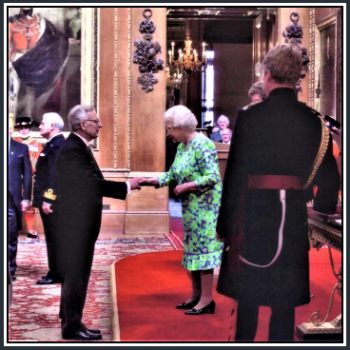 Len receiving the M.B.E. from Her Majesty The Queen
Len receiving the M.B.E. from Her Majesty The Queen
-oOo-
For those of us that have been listening to Len’s music and for the many instruments that he has restored and continue to service, we most certainly feel that he is most deserving of this honour.
 Left: Len with his medal; Right: Len with Judith & Their Daughters, Georgina & Elizabeth
Left: Len with his medal; Right: Len with Judith & Their Daughters, Georgina & Elizabeth
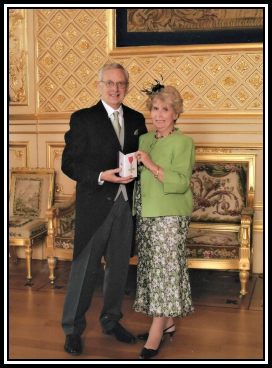 Len & Judith at Windsor Castle
Len & Judith at Windsor Castle
—oooOooo—
—oooOooo—
—oooOooo—
